
Related
Guests
- Ziad Ghanimipublic relations officer for the Gainesville Muslim Initiative. He is a PhD student at the University of Florida.
- Craig Lowemayor of Gainesville.
- Moustafa Bayoumiassociate professor of English at Brooklyn College, CUNY. He is author of How Does It Feel to Be a Problem? Being Young and Arab in America. Website: MoustafaBayoumi.com
Global condemnation grows over a Florida church’s plan to burn the Quran on September 11th. General David Petraeus warns it could endanger US troops abroad. We speak with a Gainesville student who is helping to organize a series of counter events in the community; Mayor Craig Lowe, the first openly gay mayor, who was targeted by the Florida church during his campaign; and Moustafa Bayoumi, author of How Does It Feel to Be a Problem? Being Young and Arab in America. [includes rush transcript]
Transcript
SHARIF ABDEL KOUDDOUS: International outrage is growing over a Florida church’s plan to burn the Quran on September the 11th. The Dove World Outreach Center, based in Gainesville, Florida, has vowed to burn the Muslim holy book to mark the ninth anniversary of the 9/11 attacks. On Monday, hundreds of Afghans rallied in Kabul to denounce the church’s plans. The protest came two days after thousands of Indonesians held protests in Jakarta and five other cities.
The top US and NATO commander in Afghanistan, General David Petraeus, has warned the burning could endanger US troops. The White House echoed Petraeus’s concerns. Press Secretary Robert Gibbs addressed the issue at a news conference on Tuesday.
ROBERT GIBBS: Well, look, I think the best place to look for the views of this administration would be to look at the — look at what General Petraeus said over the weekend. We know that that type of activity — we know that that type of activity is being transmitted back to places like Afghanistan, where General Petraeus obviously is our lead commander. As he said, it puts our troops in harm’s way, and obviously that any type of activity like that would be — that puts our troops in harm’s way would be a concern to this administration.
SHARIF ABDEL KOUDDOUS: In Washington, a broad coalition of religious leaders from evangelical, Roman Catholic, Jewish and Muslim organizations has called the planned Quran burning a violation of American values.
Meanwhile, Secretary of State Hillary Clinton hosted an Iftar dinner to celebrate Ramadan at the State Department on Tuesday and also condemned the planned Quran burning.
SECRETARY OF STATE HILLARY CLINTON: I am heartened by the clear, unequivocal condemnation of this disrespectful, disgraceful act that has come from American religious leaders of all faiths, from evangelical Christians to Jewish rabbis, as well as secular US leaders and opinion makers.
SHARIF ABDEL KOUDDOUS: The little-known Dove World Outreach Center is an evangelical Christian church based in Gainesville with between thirty and fifty members. It made headlines last year after handing out T-shirts that said, “Islam is of the Devil.” Its pastor, Terry Jones, was asked about Petraeus’s warning that the burning of Qurans could endanger US troops on CNN yesterday.
KIRAN CHETRY: Are you willing to have the blood of soldiers on your hands by this demonstration?
TERRY JONES: Yeah, we are actually very, very concerned, of course. And we are taking the General’s words very serious. We are continuing to pray about the action on September the 11th. We are indeed very concerned about it. It’s just that we don’t know — I mean, how long do we back down? How —-
KIRAN CHETRY: So you’re saying that you very might -—
TERRY JONES: When do we stop backing down?
KIRAN CHETRY: You might well not go through with this? You’re saying that you’re praying about it, you may not burn the Quran on September 11th?
TERRY JONES: I’m saying that we are definitely praying about it. We have firmly made up our mind, but at the same time, we are definitely praying about it. But like I said, I mean, how long — I mean, when does America stand for truth? I mean, instead of us being blamed for what other people will do or might do, why don’t we send a warning to them? Why don’t we send a warning to radical Islam and say, “Look, don’t do it.”
AMY GOODMAN: That’s Terry Jones on CNN. The St. Petersburg Times today, front page story, says he will proceed with the Quran burning.
Well, the story follows protests against the planned Islamic community center two blocks from Ground Zero here in New York and the recent arson of a construction site for a new mosque and Islamic center in Tennessee.
While Pastor Jones’s plans to burn Qurans has made headlines around the world, less attention has been paid to what local community members in Gainesville are planning in response. A group called the Gainesville Muslim Initiative has planned several counter events, including teach-ins, a peace vigil this week. The Mayor of Gainesville, Craig Lowe, has condemned the event and has declared September 11th as “Interfaith Solidarity Day.”
So we’re going to Gainesville now, where we’re joined by Ziad Ghanimi. He is the public relations officer for the Gainesville Muslim Initiative, a PhD student at the University of Florida. He’s joining us by Skype. And joining us here in the studio is Moustafa Bayoumi, an associate professor of English at Brooklyn College, CUNY. He’s author of How Does It Feel to Be a Problem? Being Young and Arab in America. And we’re joined on the telephone by the Mayor of Gainesville, Craig Lowe.
Craig, let’s begin with you, Mayor Lowe. Who is Terry Jones? In fact, you have felt his wrath, his targeting, yourself, when you ran for mayor.
MAYOR CRAIG LOWE: Yes, that is correct. Terry Jones is the pastor of a church, if that’s what you wish to call it, under such circumstances, that is very small and is a very fringe group in Gainesville, and is not someone who is representative of our community in the least. Gainesville is a community that does value every person regardless of their religion, their race, their gender, their national origin, their sexual orientation or their language at birth. We are a community that does seek for everyone to contribute to our community and welcomes contributions from everyone in our community. And we wish to project that image to the world and not the images that we see on CNN and other networks with regard to this very unfortunate series of incidents.
AMY GOODMAN: You’re the first openly gay mayor of Gainesville, and that’s why he attacked you?
MAYOR CRAIG LOWE: Well, that is correct. That was the basis for his attacks.
AMY GOODMAN: Ziad Ghanimi, tell us what you’re doing, what the Muslim — the Gainesville Muslim Initiative is and what you have been doing in preparation for the Quran burning Saturday.
ZIAD GHANIMI: Sure. So, the Gainesville Muslim Initiative has been formed about two months ago, but not necessarily to respond to Pastor Jones. Gainesville Muslim Initiative tried to increase awareness about Islam and Muslims here in the United States to counter the negative narrative that has been around about Muslims and Islam, especially with the Ground Zero mosque and what’s happening in Tennessee. What Pastor Jones did was just a way for us to proceed on our plan and to extend the number of activities that we had planned to undertake for this whole semester.
What have we planned so far? Well, it was amazing how people from other religions were very supportive of us. Many of the activities that we have planned are in partnership with churches, synagogues, and sometimes Hindu temples. We have a large majority of Hindus here in Gainesville. All of them were very supportive. And what we decided to do is have a series of events. Some of them were interfaith events, and some of them were only events initiated by Muslims and conducted by Muslims. For example, we’re having open houses at both of the mosques in Gainesville, where everyone is invited to come, and it’s going to be on September the 17th. Basically, we want people to feel reassured about the fact that if you go inside a mosque, nothing wrong is going to happen to you, nothing dangerous is going to happen to you. You’re going to be talking to people who are normal, like everyone else, and you will visit the mosque and see how Muslims pray and how they behave, and maybe people will realize that there’s nothing to be afraid of if you know Muslims or if you have Muslims as friends and neighbors.
But the most important event for us is the candlelight vigil for peace and unity. We are planning a huge event at the downtown plaza in Gainesville, where we are going to be doing a little bit what we do every week, just at a larger scale. Every week, we feed the homeless in downtown Gainesville. We’re going to be doing the same thing. Every holiday, every Muslim holiday, we try to donate blood to LifeSouth. So we invited them to bring two buses on the Bo Diddley Plaza, the downtown — in downtown Gainesville, and we’re going to be collecting blood donations for our local hospitals. We also contacted the Gainesville Public Library, and they gave us a wish list of books. So basically during the whole afternoon, we’re going to be collecting pledges for books for the Gainesville Public Library. Also we’re organizing a food drive, because it’s good to feed the homeless one time, but it’s also very interesting to have a system in place where, when the homeless need food, they know where to find it, and it is available. So, all the food that we’re going to be collecting will be given to St. Francis House, for example, or other organizations that feed the homeless on a regular basis. Finally, and the most important part of that event, is a candlelight vigil for peace, where we invited all the leaders of the organizations that have been supportive to us. They’re going to make a short statement, and after that we’re going to light our candles, observe a minute of silence in the memory of the victims of September 11 and for peace and unity and tolerance and mutual respect. Muslims believe that if we stand together, we can achieve great things together, as opposed to looking at each other’s differences.
Finally, there’s another very big event on the 10th of September. It’s hosted by a church, actually. And what’s going to be happening there is we’re going to be reading from the different holy scriptures of the major religions in Gainesville. We’re going to be reading from the Quran. We’re going to be reading from the Bible. We’re going to be reading from the Torah and other holy scriptures. It’s going to be a long event, where dinner is going to be provided. But most of all, it’s — we are trying to get together, get to know each other, and get to get closer to each other, as opposed to focusing on differences.
SHARIF ABDEL KOUDDOUS: And I want to bring into this conversation Moustafa Bayoumi. Your book is called How Does It Feel to Be a Problem? Being Young and Arab in America. Talk about what’s happening right now with this planned Quran burning. We had the angry protest against the downtown Islamic community center two blocks from Ground Zero. We had this burning of a construction site of a planned mosque in Tennessee. Talk —- put this all in context for us.
MOUSTAFA BAYOUMI: Well, yeah, I think we are seeing a flare-up of a kind of anti-Muslim sentiment in the country that is, frankly, very troubling. Of course, it’s nothing that’s so brand new. Ever since September 11, 2001, and really beforehand, as well, but since September 11th, 2001, we’ve seen a rise of anti-Muslim sentiment within the country. Polling data will bear this out. You have many polls done, year after year, that talk about what’s the general population’s view of Muslims, for example. And usually those polls, of late, anyway, show that somewhere between 40 and 50 percent of the American population harbor, or admit to harboring, prejudice against Muslims.
But what you find, I think, in recent years, especially over the last few months, is that this has taken a different kind of turn. It’s become more a kind of vitriolic sort of community-based anger at Muslims. And frankly, it seems very surprising, I think, to many people in the Muslim community, who had been counting on the good graces of their neighbors and understanding to carry on the traditions of the free exercise of religion in the country and just the daily actions of American democracy.
AMY GOODMAN: Are you concerned about Saturday night being the end of Ramadan -— it’s also September 11th — the Iftar dinner, the final dinner of Ramadan, being a time of celebration, and yet it falling on September 11th and how that could be misconstrued?
MOUSTAFA BAYOUMI: Yes. I think not only am I concerned, but in fact many of the mainstream and major Muslim organizations have actually asked their congregations and their communities to play down the levels of celebration this year, so it doesn’t seem like it’s somehow a celebration of the September 11, 2001, of the attacks, which would be horrible if that were seen to be the case.
But by the same token, I do think it’s important, as you mentioned in your introduction — it’s very important to emphasize the people of good conscience in the country who are actually standing up to oppose this kind of anti-Muslim sentiment, anti-Muslim fervor that we see. There are many. And what we need to have, actually, is many more, particularly from the political leadership, I think, in this country. And they have been, I think, very cowardly in being willing to stand up for the fundamental principles, particularly the free exercise of religion. And I think it’s important even — I think it’s important in that regard to highlight people like Mayor Bloomberg and Scott Stringer and others, including public figures such as yourselves or Jon Stewart, who have stood very eloquently, spoken out eloquently for the rights of Muslims, understanding that if you are actually supporting the rights of Muslim Americans, what you’re really doing is supporting your right as an American for those — to exercise those same rights.
SHARIF ABDEL KOUDDOUS: Well, it almost seems like — and we’ve seen this before in American history — people trying to redefine what being an American means.
MOUSTAFA BAYOUMI: I think that’s exactly right. I think that we — I think that the definition of being an American is something that is constantly in process. It’s nothing that’s settled. And in fact, it’s a procedure, it’s a process that continues from the very beginning of this country until today. And what we find of late, I think, is a disturbing measure of what it means to be an American. I, in fact, think that it’s also important to place the anti-Muslim sentiment that we see today alongside the kind of anti-immigrant feeling that we see today. So I think if we consider the Arizona initiatives, for example, or just the general pervasive anti-immigrant feeling that you have, directed largely against Latinos and Hispanics in this country, alongside the anti-Muslim sentiment — and I would also put in that same parameter the polling data that we see that sees that President Obama is — 20 percent of the population wants to say that President Obama is a Muslim. I think that that’s actually a thinly disguised way of talking about President Obama’s racial background. It’s a way of saying he’s not like us. And so, rather than using the traditional language, the traditional discourse of race in this country, which is to call him an African American or such, they call him instead a Muslim, which is a way of saying he’s not one of us.
AMY GOODMAN: We have to leave it there. Moustafa Bayoumi, Mayor Lowe and Ghanimi, thank you very much for joining us.

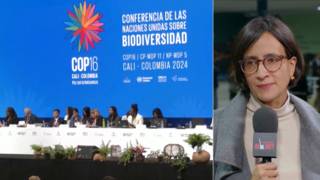
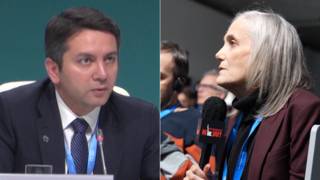
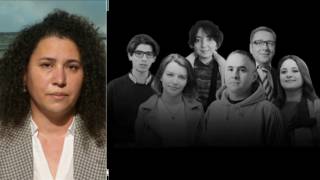
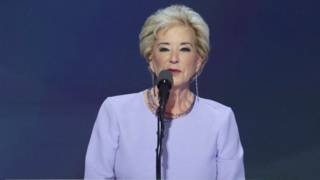





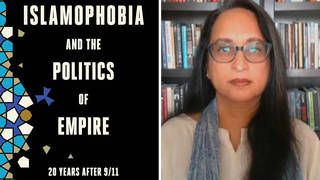
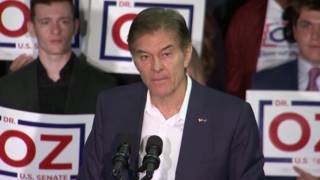
Media Options